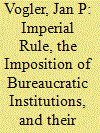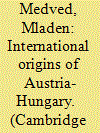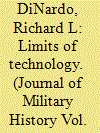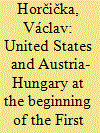|
|
|
Sort Order |
|
|
|
Items / Page
|
|
|
|
|
|
|
| Srl | Item |
| 1 |
ID:
169493


|
|
|
|
|
| Summary/Abstract |
Significant variation in the institutions and efficiency of public bureaucracies across countries and regions are observed. These differences could be partially responsible for divergence in the effectiveness of policy implementation, corruption levels, and economic development. Do imperial legacies contribute to the observed variation in the organization of public administrations? Historical foreign rule and colonization have been shown to have lasting effects on legal systems, political institutions, and trade in former controlled territories. Imperial legacies could also explain variations in the performance of public administrations. The author uses the case of Poland to investigate the long-term effects of foreign rule on bureaucratic systems. Historically, Poland was split between three imperial powers with very different public administrations: Prussia, Austria, and Russia. Statistical analyses of original data collected through a survey of more than 650 Polish public administrations suggest that some present-day differences in the organization and efficiency of bureaucracies are due to imperial legacies.
|
|
|
|
|
|
|
|
|
|
|
|
|
|
|
|
| 2 |
ID:
191671


|
|
|
|
|
| Summary/Abstract |
This article examines the emergence of Austria-Hungary from the perspective of uneven and combined development (UCD), which unifies social and geopolitical modes of explanation. It argues that UCD can explain the ‘paradoxical’ role of Hungary, a relatively backward society that was at the forefront of the 1848 revolutions and the political reorganisation of the Austrian Empire in 1867. However, it maintains that potentials of UCD have not been realised even in recent UCD interpretations of the Monarchy due to declinist assumptions. The article argues that the international management of UCD via the Concert of Europe inflated Austrian power, but could not prevent sociopolitical change, laying the ground work for its later deflation. The Austrian Empire also faced the challenge of revolutionary Hungary. The article demonstrates that its intersocietally generated peculiarities resulted in the gentry initiating the transition to capitalism to counter the geopolitical threat of industrialising Austria and arrest its social decline. Despite defeating Hungary and introducing capitalist social relations, the strength of Austrian dynasticism prevented the emergence of a hegemonic bloc and political stabilisation. It was this political weakness rather than economic backwardness that might better explain its expulsion from Germany in 1866. The article then turns to a comparison of the political economies of Prussia/Germany and Austria-Hungary and questions the overemphasis on Austro-Hungarian backwardness. By offering a new interpretation of Austria-Hungary, the article contributes to a rethinking of nineteenth century international relations and the long-term causes of World War 1
|
|
|
|
|
|
|
|
|
|
|
|
|
|
|
|
| 3 |
ID:
141791


|
|
|
|
|
| Summary/Abstract |
The invasion of Serbia in October 1915 saw the Serbian army, which had fought off three separate invasions by Austria-Hungary the year before, driven out of Serbia within six weeks. A critical land route to Turkey and Bulgaria was opened, and Austria-Hungary’s southern flank was secured. The forces of the Central Powers made extensive use of the most modern technology of the day—including railroads, bridging, aircraft, artillery and telephone—and demonstrated their potential. This article suggests that while they gave the Central Powers a major edge early, the campaign also revealed the limits of these technologies.
|
|
|
|
|
|
|
|
|
|
|
|
|
|
|
|
| 4 |
ID:
170923


|
|
|
|
|
| Summary/Abstract |
The United States and Austria-Hungary regarded each other with growing interest during the early stages of the First World War. This analysis demonstrates that it was not a sudden change brought on by the war. Moreover, after July 1914, the Woodrow Wilson Administration had a tendency to underestimate Austria-Hungary’s ability to act independently, considering it dependent on Germany. At the same time, America hoped to drive a wedge between the Central Powers to end the struggle. Conversely, Austria-Hungary viewed American neutrality with growing disdain, especially in terms of naval warfare that decreased United States’ diplomatic manoeuvring. There were, however, several other mostly humanitarian aspects of the war and their impact on the mutual relations between the two countries in 1914.
|
|
|
|
|
|
|
|
|
|
|
|
|
|
|
|
|
|
|
|
|